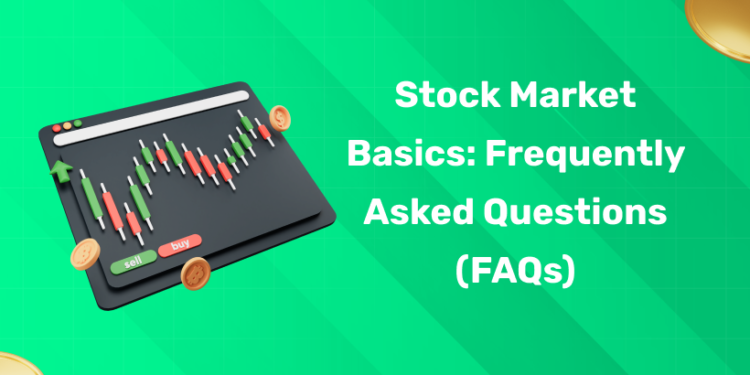Want to grow your wealth or build long term financial security? Understanding the stock market is a must. The stock market may seem complex and scary especially to beginners but with a clear understanding of its basics, brokers, IPOs and regulatory framework like SEBI it becomes a powerful tool for financial empowerment. In this comprehensive guide we will answer the most frequently asked questions about the stock market with detailed explanations to help you navigate your investment journey with confidence.
1. What is the stock market and how does it work?
The stock market is a platform where investors can buy and sell shares of listed companies. It provides a platform for companies to raise capital by issuing stocks to the public through an Initial Public Offering (IPO). Once listed these shares can be traded among investors. Stock prices are determined by demand and supply dynamics influenced by company performance, industry trends, macroeconomic factors and investor sentiment. There are two types of markets in the stock market: the primary market where new issues are offered and the secondary market where existing shares are traded.
2. What is Sensex and Nifty?
Sensex is an index with a collection of 30 top companies with the highest market caps. It is the index of BSE. In the same way Nifty is the index of NSE with the collection of the top 50 companies.
3. Who regulates the stock market in India?
Securities and Exchange Board of India (SEBI) is the regulatory body that oversees the stock markets in India. SEBI’s main function is to protect the interests of investors, promote the development of the securities market and regulate its operations. It enforces rules to ensure transparency, fair trading practices and prevention of fraudulent activities. SEBI monitors brokers, mutual funds and listed companies to maintain a fair and efficient market ecosystem.
“Be fearful when others are greedy, and greedy when others are fearful.” – Warren Buffet
4. What is an IPO (Initial Public Offering)?
An IPO is the process through which a private company goes public by offering its shares to the public for the first time. IPOs are launched to raise capital for business expansion, to reduce debt or to meet regulatory requirements. Once the IPO is closed and the shares are allotted they are listed on stock exchanges like NSE or BSE. Investing in IPOs can be profitable if the company has good fundamentals but it also comes with risks especially on listing day.
Learn Stock Marketing with a Share Trading Expert! Explore Here!
5. How do I start investing in the stock market?
Open a demat and trading account with Zerodha. Complete KYC, link your bank and deposit funds, ₹5,000 is enough to start. Research stocks like Reliance or sectors like renewable energy, hot in 2025. Use Upstox for real-time data and start with small investments. A Bengaluru beginner might buy five shares of Tata Motors, learning as they go. Join SEBI’s free investor workshops. Patience and research are key to avoiding losses.
6. What’s the difference between equity and mutual funds?
Equity stocks are direct investments in companies, offering high returns but higher risk, like buying Adani Green shares. Mutual funds pool money to invest in a diversified portfolio, managed by experts, reducing risk but charging fees (1–2%). A Delhi investor might buy equity for quick gains or mutual funds via Groww for stability. In 2025, mutual funds grow 15% annually, per AMFI data.
7. How do I choose a stock broker in India?
Pick a broker based on fees, platform ease, and support. Discount brokers like Zerodha charge ₹20/trade, ideal for DIY traders, while ICICI Direct offers advice for beginners at higher costs. A Chennai investor might choose Upstox for its user-friendly app. In 2025, 60% prefer discount brokers, per SEBI. Check SEBI registration and reviews on MouthShut. Test platforms with demo accounts to ensure they fit your trading style before committing.
8. What is an IPO, and should I invest in one?
An IPO is when a company, like Nykaa, sells shares to the public to raise funds. Investors apply via brokers, hoping for listing gains, like Zomato’s 66% jump in 2021. Research financials, as 30% of 2024 IPOs underperformed, per BSE data.
9. What is SEBI’s role in the stock market?
SEBI governs India’s market, ensuring fairness and investor protection. It monitors brokers, IPOs and compliance, like the 2023 DPDP Act for data security. In 2025, SEBI will educate 10 million investors. Its penalties, like ₹25 lakh for manipulation, keep trust. Check SEBI website for registered brokers and investor resources.
“In the short run, the market is a voting machine but in the long run, it is a weighing machine.” – Benjamin Graham
10. What are the types of stock market brokers?
Stock market brokers are intermediaries who facilitate buying and selling. There are two types:
- Full-service brokers: They offer everything – research, advice, portfolio management, personal guidance. Examples are ICICI Direct, HDFC Securities, Kotak Securities, ShareKhan.
- Discount brokers: They offer basic services like buying and selling at lower costs, usually through online platforms. No personal advice. Popular discount brokers in India are Zerodha, Upstox, Groww.
Choose the right broker based on your investment style, need for research and budget for brokerage fees.
11. How to start investing in stock market in India?
To start investing follow these steps:
- Open Demat and Trading Account with a registered broker.
- Link your bank account to fund your trades.
- Complete KYC as mandated by SEBI.
- Research and analyze stocks based on your goals and risk appetite.
- Place your first trade through your trading account.
Start with small amounts and gradually increase as you gain confidence and understanding.
12. What is a Demat account and why is it important?
Demat account holds your shares and securities in electronic format. It eliminates the need for physical share certificates, thus reducing the risk of theft, forgery and damage. When you buy a share, it gets credited to your Demat account, when you sell, it’s debited. You must have a Demat account to trade or invest in Indian stock markets. NSDL and CDSL are the two primary depositories that maintain Demat accounts in India.
13. What are the risks of investing in the stock market?
Stock market investments can give high returns but also come with risks. These are market volatility, economic downturns, poor company performance, and global geopolitical issues. Uninformed investment decisions can lead to losses. Diversify your portfolio, stay updated with market trends, and invest based on research rather than speculation.
14. What is the role of stock exchanges like NSE and BSE?
NSE and BSE are the two main stock exchanges in India. They provide platform for trading in equity, debt and derivatives. They ensure liquidity, transparency and orderly trading. And they use electronic systems to match buy and sell orders, facilitate clearing and settlement and maintain market integrity.
15. What is the difference between a trader and an investor?
A trader is a person who buys and sells stocks frequently, like in a day or a week. And he does not hold the stock for long. But an investor is a person who buys the shares and holds them for more longer time.
16. Can the stock market help in building long-term wealth?
Yes, historically stock market has outperformed most other asset classes over long term. Companies grow over time, their value increases, and well-performing stocks give compounded returns. With systematic investment and the power of compounding, the stock market can help in building wealth over the years if guided by research and patience.
17. How many demat accounts can a person have?
A person can have multiple demat accounts with a verified PAN number.
18. How the share price or stock price move up and down?
The price of the stock is calculated using the supply and demand of the stocks. Example if the Stock named X is in high demand do to some news then the price of the stock started to increase and same way due to some issue if people start to sell the stocks, then the price also started to correct.
19. Will stock market give overnight success ?
As there are frequent hearing news about overnight success it’s not possible as it say. We can have overnight success with conviction and deep understanding of stock market influencing factors.
20. What are candlesticks?
Candlesticks are the basic chart models that helps us to figure out the stock price easily. It helps us to represent previous and current market price for visual manner.
21. What is a market crash?
A market crash is an uncertain condition where stock prices of the companies start to drop due to major global or economic conditions. The 2020 stock market crash is an example where the market crashed almost 50% due to the coronavirus spread.
23. What documents are required for you to start a demat account?
You need documents like PAN card, Aadhar, and a bank account number in a nationalised bank.
24. What is KYC?
KYC is the abstraction of Know your customer and basically it means to verify that your details are correct as entered. It checks the PAN number, bank account, Aadhar number you provided are correct.
25. What is the minimum amount to start to investing ?
There is actually no minimum amount you can start with, as little as 100 rupees.
“The big money is not in the buying or the selling, but in the waiting.” – Charlie Munger
26. What is bear market and bull market?
Bear market and bull market are the opposite of each other. When the economic and business conditions are good, the stocks start to move up and investors make good profits. This cycle is called bull market. On the other hand, due to global or economic problems, the stock price of the companies starts to fall, and for a long time investors get zero or negative return. This cycle is called bear market.
27. What are shares or stocks?
A share or stock represents ownership in a company. A company splits its ownership into smaller units called shares. When you buy a share you become a shareholder, meaning you own a part of that company. Shareholders may get dividends which are a portion of the company’s profit and they also have the potential to earn capital gains if the value of their shares increases over time.
28. What is F&O?
F&O is the derivative market that works as contracts depending on the underlying assets. Futures and options are the major types of stock derivatives used for trading in the share market. These are contracts signed by two parties for trading in a stock asset at a predetermined price on a later date.
29. What are blue chip stocks?
Blue chip stocks are stocks of very large companies with a great track record of profitability and good fundamentals. They are too big to fail companies like Reliance, SBI , TCS etc.
30. How can I get good knowledge in investing and trading?
You can be a pro in stock market by understanding how the stock market works, what are the factors influencing it and also with being in the journey you get to understand and become pro. Also you can try checking stock market course like Entri stock market course to make the journey easier.
31. What is the age limit to have a demat account?
There is no age limit to open a demat account. If you have a PAN and bank account you can start the investing journey. But if you are below 18 years of age, then you may need a guardian to handle your demat account.
32. Can government employees do the stock market investing?
Yes, government employees can also invest in the stock market, but they cannot do day trading and futures and options.
Master stock trading with us. Enroll now for a free demo!
Key Takeaway
The stock market is a dynamic ecosystem with the potential to make a lot of money. But before getting into the stock market, you should be well aware of the entire system and how it works else it can ruin you. It’s all about knowledge, patience, and the ability to control your emotions. Check out Entri stock market course to become a pro trader in the stock market.
Remember: informed decisions are the first step toward successful investing.
Stay curious, stay invested.
Disclaimer The information provided in this article is for general informational purposes only and is not intended as investment advice, financial guidance, or an offer or solicitation to buy or sell any securities. Stock data and financial figures are sourced from publicly available information and are believed to be accurate at the time of publication; however, we do not guarantee their accuracy or completeness. Past performance is not indicative of future results. Readers should conduct their own research or consult a qualified financial advisor before making any investment decisions. The author(s) and the publisher disclaim any liability for any loss or damage arising directly or indirectly from the use of or reliance on the information provided herein.
Stock Market Training Reviewed & Monitored by SEBI Registered RA
Trusted, concepts to help you grow with confidence. Enroll now and learn to start investing the right way.
Know moreFrequently Asked Questions
What is the stock market and how does it work?
The stock market is a platform where shares of publicly listed companies are bought and sold. It operates through exchanges like NSE and BSE, where investors trade stocks based on supply and demand. Prices fluctuate according to factors like earnings, news, and overall market sentiment.
What is the role of SEBI in the Indian stock market?
SEBI (Securities and Exchange Board of India) is the regulatory authority for India’s securities market. It ensures investor protection, enforces transparency among companies and brokers, and curbs malpractices like insider trading and pump-and-dump schemes. SEBI also regulates IPO approvals and audits.
What is an IPO and how can I invest in one?
An IPO (Initial Public Offering) is when a private company offers its shares to the public for the first time. You can invest through your Demat account by applying via ASBA (Applications Supported by Blocked Amount) through your broker or banking platform during the subscription window.
What is a Demat and trading account? Are they different?
Yes, a Demat account holds your shares in digital form, like a locker, whereas a trading account is used to place buy or sell orders in the stock market. Both are necessary to participate in stock trading in India and are usually provided together by brokers.
How do I choose the right stock broker?
When selecting a broker, consider brokerage charges, account maintenance fees, trading platform quality, customer support, and additional services like research tools. Popular brokers include Zerodha, Upstox, ICICI Direct, and Groww.
What are stock market indices like Nifty and Sensex?
Indices like the Nifty 50 and Sensex represent a basket of the top-performing companies listed on the NSE and BSE respectively. They act as a barometer for the overall market sentiment and provide insights into broader economic trends.
What is fundamental vs. technical analysis?
Fundamental analysis involves evaluating a company’s financial health, earnings, growth potential, and economic conditions. Technical analysis studies historical price charts and indicators like moving averages or RSI to predict future price movements.
How risky is stock market investing for beginners?
Stock market investments carry risk due to price volatility, but long-term investing based on fundamentals generally reduces risk. Beginners should avoid speculation and instead focus on blue-chip stocks, mutual funds, or index investing to build a stable portfolio.
What are dividends and how do they benefit investors?
Dividends are a portion of a company’s profits paid to shareholders, usually quarterly or annually. They provide a passive income stream and are often seen as a sign of a financially healthy company.
Can I invest in the stock market with a small amount?
Yes, you can start investing with as little as ₹100. Many brokers now offer fractional investing or allow buying 1 share at a time. Systematic Investment Plans (SIPs) in mutual funds are another beginner-friendly option for disciplined investing.














